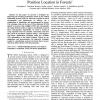Free Online Productivity Tools
i2Speak
i2Symbol
i2OCR
iTex2Img
iWeb2Print
iWeb2Shot
i2Type
iPdf2Split
iPdf2Merge
i2Bopomofo
i2Arabic
i2Style
i2Image
i2PDF
iLatex2Rtf
Sci2ools
100
click to vote
WCNC
2008
IEEE
2008
IEEE
An Improved Method for GPS-Based Network Position Location in Forests
—In this paper we present a technique for improving the location performance based on the Global Positioning System (GPS) for networks of nodes in harsh environments and demonstrate its efficacy via a combination of simulations and measurements in forests. The technique relies on the use of Ultra-wideband (UWB) signals to measure time-of-flight (TOF) and consequently the range between nodes to improve localization in harsh forest environments. Specifically, we create a system of range equations based on network connectivity and solve this system of non-linear equations using a Least-Squares Non-Linear optimization technique using any available GPS information as the initial estimate. Based on our simulations and measurements, the improved technique results in a localization accuracy in forests that is on par with clear-field reference GPS measurements.
Harsh Forest Environments | Non-Linear Optimization Technique | Reference Gps Measurements | WCNC 2008 | Wireless Networks |
Related Content
| Added | 01 Jun 2010 |
| Updated | 01 Jun 2010 |
| Type | Conference |
| Year | 2008 |
| Where | WCNC |
| Authors | Christopher L. Hutchens, Brian R. Sarbin, Alyse C. Bowers, Jason D. G. McKillican, Kyle K. Forrester, R. Michael Buehrer |
Comments (0)

